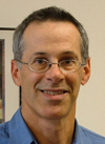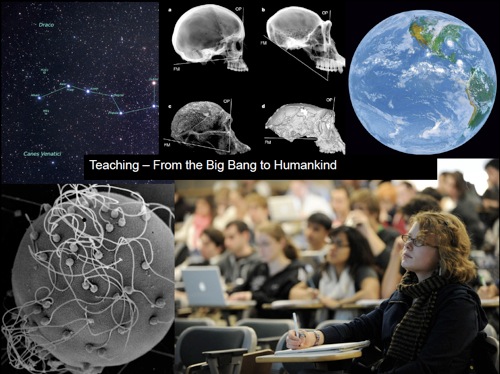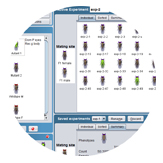 Professor David Walt
Professor David Walt
Title: Research as a Goal of Education and Education as a Goal of Research
Seminar Date & Time: Friday, February 17, 2012 @ 3:00 pm
View the slides from Professor David Walt’s Seminar
Listen to Professor David Walt’s Seminar
Professor David Walt is a Robinson Professor of Chemistry, Professor of Biomedical Engineering, and Professor of Oral Medicine at Tufts University and is a Professor of the Howard Hughes Medical Institute (HHMI). Professor Walt and the program director, Meredith Knight, shared with us that the main goal of their HHMI program is to bring research into education and utilize every opportunity to educate through research.
Both Professor Walt and Meredith Knight engage undergraduates in developing multi-year research projects. During the talk, Professor Walt described one such project, which is an open-ended, “Maternal Ancestry” experiment designed by a team of undergraduate students. Since the Maternal Ancestry experiment was designed for use in a high school classroom, the development team had to juggle opposing factors such as limited budget, time and equipment while ensuring that the experiment is engaging to students and contains real-world applications.
The Maternal Ancestry project, which is also known as “From Spit to SNP”, is an experiment in which students can investigate their ancestry by studying their mitochondrial DNA (mtDNA). mtDNA provides a unique opportunity to interrogate students’ ancestry due to the fact that mtDNA is only inherited from one’s maternal lineage. Students can determine their ancestry by examining the inheritance of specific sequences, called single nucleotide polymorphisms (SNPs), within the mitochondrial DNA (mtDNA) that are unique to specific populations of the world. Depending on a student’s ancestry, this experiment can potentially narrow down their region of origin to a 50-100 km region worldwide! For more detailed information regarding the experiment specifics, check out the program’s website.

Unique sequences within mitochondrial DNA are analyzed to determine ancestry. Click image to enlarge.
Prof. Walt described the team of Tufts students, faculty, staff, and high school science teachers and administrators who pilot-tested and implemented these week-long experiments in 11 classrooms within four local school districts: Boston, Malden, Medford, and Somerville. Successful implementation in the high school classroom was the result of an amazing collaboration of undergraduate, graduate, and postdoctoral researchers in the Walt Laboratory to design experiments for high school students and assist in training high school students and science teachers. First, undergraduates served as mentors to interested high school science teachers for one-week during the summer. During this time, the teachers learned how to perform the experiment themselves. Second, Professor Walt and Meredith Knight amazingly ensured that each classroom had access to the necessary, expensive equipment to perform the experiments by initiating an instrument-lending library. Third, prior to implementation in the classroom, the undergraduates again served as mentors to a few select high school students, who in turn, then served as peer mentors during the in-class experiment. Last, a team was on-hand in the classroom while the experiment was performed to make sure that everything proceeded smoothly. Through this collaboration, Professor Walt and his team were able to reach 300 students in four schools in one year!
Meredith Knight detailed the quantitative successes of the high school science experiment program. The team implemented a multi-faceted assessment to determine 1) student learning gains through pre- and post-quizzes, 2) focus groups with high school teachers pre- and post-implementation, and 3) focus groups with professors and administrators pre- and post-implementation. Meredith declared the program a success; students had significant learning gains in terms of learning about research through the experiment and additionally enjoyed their laboratory experience.

"From the Big Bang to Humankind" introduces students to science through a truly interdisciplinary course. Click image to enlarge.
Professor Walt told us about an interdisciplinary course that he initiated, entitled “From the Big Bang to Humankind”. Professor Walt is the Lead Professor of this course and has the incredible task of creating a team of expert faculty members from Tufts University, Boston University and University of Massachusetts at Boston to teach the course. It is a science distribution course for non-science majors at Tufts University and teaches approximately 100 students each year about the interdisciplinary nature of science by focusing on the evolution of the universe.The course traces the evolution of the universe by exploring “Five Big Questions about the Universe” and spans five departments: 1) the origin and fate of the universe (astronomy), 2) the formation of the Earth and its structure (geology), 3) the chemistry of life (chemistry), 4) the evolution and development of complex organisms (biology), and 5) the onset of modern humans (anthropology).
Meredith Knight then told us about a detailed assessment of student learning gains in this course. The assessment study focused on the “Five Big Questions about the Universe” and utilized a pre- and post-quiz administered at the beginning and end of the semester, respectively. Meredith found that students had significant learning gains across all aspects of the course. More specifically, she found that the depth of understanding in students’ answers to the open-ended response questions increased significantly.
Through these two programs, “From Spit to SNP” and “From the Big Bang to Humankind”, Professor Walt, Meredith Knight and the rest of their team were able to deliver contemporary, engaging science to students who ordinarily would not encounter it.




